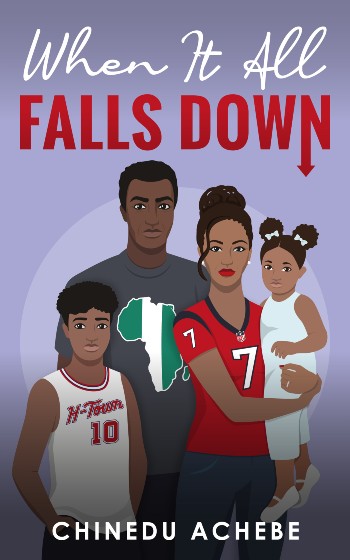Book Review: When It All Falls Down
Reviewed by:
Ahmad WrightRemember when Colin Kaepernick knelt during the national anthem in 2016? When HBO’s Insecure, created and produced by Issa Rae in 2016, was must-watch TV? When Kobe Bryant died in 2020? When It All Falls Down’s polaroid-narrative style chronicles community moments in a pre-COVID-19 summer 2020 lockdown, through the heart of the pandemic, to the January 6 Capitol Riot. When It All Falls Down, the third novel by Chinedu Achebe, is set in Houston, Texas, though it feels like it could be anywhere families meet and stay close. The story highlights a series of emotional and intuitive reactions experienced by a Nigerian family and their extended family and friends during the tide of the last presidential campaign season, where a country wrangled between the tension of a second Trump Presidency and a then savior in Vice President Biden. Obi and Nkechi Ifeanyi are working professionals whose drama and conflict revolves around their own issues and those of a range of extended family members that include in-laws, cousins, parents, would-be lovers, and friends. All these characters join in the sounding boards that fuel the reader with enough political commentary on social issues and Black culture—from gossip to global—as fast as one can debate when the follow-up album to Miseducation of Lauryn Hill will drop. Even Obi and Nkechi’s kids, nine-year-old Ikechukwu and three-year-old Chimamanda, the jewels of this upwardly mobile African couple’s eye, are anchored firmly in the fictional landscape where real issues of the recent past frequently acknowledge their roles, whether they on a parental trip to a Black Lives Matter protest or have their education on pause during the height of the COVID lockdown.
The strongest parts of the story are when the banter presented through a character’s discourse is shut down. Once the preaching stops, we may experience the characters stripped down as individuals rather than conduits for or against a government policy issue. For example, while examining the actual cost of Obi recently losing his job during COVID as he counts down the days of his severance is a real feeling of despair, fear, and anxiety for any person who provides for a family. Obi’s thirty-seven-year-old sister, Chinwe, endures trials of a single woman looking for love forever pressured by her mom, Ijeoma, to get married. Similarly, Obi’s wife, Nkechi, craves intimacy from her husband that he cannot give as he would like. In fact, the focus on these two central characters allows topics around couples therapy, sexual disfunction, desire, and the true mechanics of a working marriage to be on full display, flaws and all. Not to mention, Nkechi also deals with the reality of aging parents. The couple’s host of friends such as Nnamdi along with other ancillary family provide vehicles for comic relief and introspection to help convey even more serious issues like male fertility, virility, cheating, sex, and getting old in a way that compliments the lighthearted tone of the story.
Pride and heritage ooze between the lines here. Obi’s Uncle Ugo introduces a side narrative of his recollection of the Nigerian Biafran War, a civil war in Nigeria from (appx.) 1967 to 1970, as he provides slices of history for a documentary film being put together by a woman who was his first love. This scene and others like it, where Obi explains to his son the significance of his long name, present areas in the text that speak volumes, but seem to be cut short. “Son, your full name, Ikechukwu, means the power of God… never try to dim your light to try and make other people feel comfortable with you.” Like Nkechi’s recollection from her college days regarding the use of her given Nigerian name, these scenes point to a powerful undercurrent in the novel that only skirts the surface of what the narrative could represent for the reader. Concurrent storylines are appreciated in fiction, but this novel begs for a single story—any one of them presented in the novel—that includes the unique cultural tradition of a successful Nigerian family living in a robust American city such as Houston. At a little more than 200 pages When It All Falls Down draws the reader in; however, an additional 100 pages extending the family dynamics would have made for a more rewarding read.


